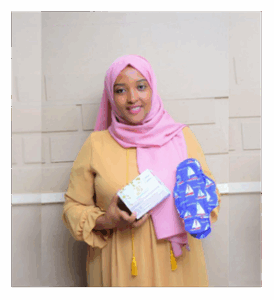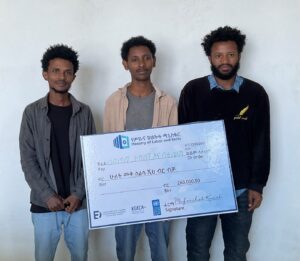Innovation in Practice: Jimma University’s Role in Ethiopia’s Research Commercialisation Push
In Ethiopia, a growing number of researchers and entrepreneurs are working to address local challenges through innovation. At Jimma University, three initiatives highlight how targeted support can help ideas move from concept to market.
Fayza Shemu, a material science lecturer at Jimma University, was moved by her mother’s account of how women and girls in the Gamo region managed their menstruation. This led her to explore alternatives to synthetic menstrual products, which are often unaffordable and believed to be linked to perceived health risks. Hayat Hassan, a food scientist, focused on processing underutilised crops like enset, pumpkin and lupin to develop noodles. While three Jimma alumni – Bernabas Tekkalign, Buli Amensisa and Gutu Goromisa – created DawaFinder, a mobile app designed to improve access to medication during emergencies. These innovators represent a growing cohort of researchers seeking practical solutions to community challenges.
Jimma University identified several barriers contributing to low rate of commercialisation: limited access to co-working spaces, technical support, and a need for continuous capacity development. Women, in particular, have been underrepresented in research and innovation, with many confined to traditional roles and few in leadership positions. Through its Innovation Incubation Centre (JU-IIC), supported by the Research and Innovation Systems for Africa (RISA) programme, the university is helping researchers and entrepreneurs move ideas from concept to market—addressing local challenges in health, agriculture, and education.
Supporting Women-Led Innovation

One of the centre’s successes is Bina Products, founded by Fayza. Bina creates low cost, safe to use sanitary pads and contributes to addressing issues generated from unaffordable sanitary products such causing girls to miss school during their menstrual period leading to poor academic performance, and potential dropout which significantly affect girls’ education. With support from JU-IIC, Viktoria Ventures and RISA, Fayza transitioned from academic researcher to entrepreneur, leaving her position at Jimma to lead Bina Products. She received business training through a partnership with Viktoria Ventures and financial support of 200,000 birr (approximately $1,587 USD), which enabled her to rent office space in Addis Ababa and begin production. Bina Products now manufactures biodegradable menstrual pads made from plant-based and cotton fabrics. These pads are reusable for up to two years, affordable for low-income households, and environmentally friendly.
‘Girls would either miss school during their menstrual cycles due to discomfort, stigma, and feelings of shame associated with not having proper menstrual hygiene products’ Fayza Shemsu.
In its first eight months, Bina Products received product certification and sold 1,400 units. The company also developed a disposable pad prototype and is exploring other innovations, including innovation for more ecofriendly materials. Fayza’s work contributes to alleviating both health and education challenges in young women in Ethiopia.
Tackling Food Insecurity with Local Ingredients
Another innovator supported by JU-IIC is Hayat Hassan, a researcher focused on food security. Hayat developed a noodle product using underutilised, climate-resilient ingredients such as pumpkin, banana, and lupin. Her goal was to create a nutritious, locally sourced alternative to traditional noodles, which often rely on imported ingredients.
Before joining the incubation programme, Hayat had a concept but lacked the resources to develop it. JU-IIC provided training, coaching, and financial resources, covering costs for raw materials and sample preparation. This support enabled Hayat to develop and refine her prototype, through analysing the nutritional content of her ingredients and optimise the formulation.
“The most significant thing is that I’m happy that I’m working on a product that can help at the national level, influencing the national food security challenge….. I am [also] a witness from the Empower Her program. They empower women in research and innovation and the commercialization of products. I think I’m the winner’, Hayat Hassan.
The product is now in the testing phase and has received positive feedback from potential consumers and organisations focused on food security. Hayat expressed pride in contributing to national efforts to combat hunger and malnutrition. She also credited the Empower Her program at Jimma University for helping her develop time management and entrepreneurial skills, noting that it empowered her to focus on her product and personal growth.
Digital Solutions for Healthcare Access
Jimma University’s support also extends to digital innovation. DawaFinder, a mobile application developed by three alumni, aims to improve access to medication in Ethiopia. The app allows users to search for medications by typing or scanning prescriptions and helps pharmacists manage inventory. It also incorporates blockchain technology to enhance authenticity and traceability.
Bernabas, Buli and Gutu received office space at JU-IIC, participated in a university-organised pitch competition, and secured 125,000 birr in initial funding. They were later selected for an accelerator program, receiving an additional 190,000 birr. The university also facilitated their participation in the Global Entrepreneurship Festival, where they won second place and a $5,000 prize.

DawaFinder is currently being piloted in six pharmacies in Jimma. A pharmacist involved in the trial described the app as a “game-changer,” improving inventory management and customer service. The team continues to receive support from the university as they transition to independent operations.
Jimma University’s incubation efforts have led to several important outcomes:
- An increase in innovations progressing from ideation to prototyping and piloting.
- A steady rise in registered startups commercialising their research.
- Improved access to finance for innovators.
- Enhanced infrastructure and technical support.
- A growing ecosystem supported by government departments, industry, development partners, and entrepreneurship organisations.
Jimma University’s experience also reflects the evolving approach to creating pathways to scale under the RISA programme. Over the lifetime of RISA, more than 500 innovations and research products have been identified, with efforts focused on enabling these concepts to grow sustainably and achieve broader uptake. A multi-pronged strategy has emerged—one that ensures innovators and researchers have the capacity to build on their ideas and access the physical and social infrastructure needed to do so, whether through virtual or physical spaces.
Strengthening partnerships and networks have also played a critical role. The Ethiopian Ministry of Education adopted a collaborative approach in developing incubation standards, engaging government agencies, 40 public universities (including Jimma), and private incubators. The resulting national incubation framework has been disseminated and endorsed by the Ministry and stakeholders, with 40 university vice presidents involved in ensuring adoption. These efforts underscore the importance of multi-stakeholder collaboration in breaking down silos, guiding strategic decision-making, and aligning innovation efforts with local and national priorities.
These developments reflect a shift toward a more inclusive and productive innovation landscape. By addressing systemic barriers and providing targeted support, Jimma University is helping researchers and entrepreneurs contribute to national development priorities.
The RISA Fund (2020-2025) is a multi-country initiative funded by the UK government, designed to strengthen research and innovation systems across Africa. It brings together two complementary programmes under the Foreign, Commonwealth and Development Office’s (FCDO) Research and Evidence Division—Strengthening Research Institutions in Africa (SRIA) and African Technology and Innovation Partnerships (ATIP)—to harness synergies and drive systemic change.